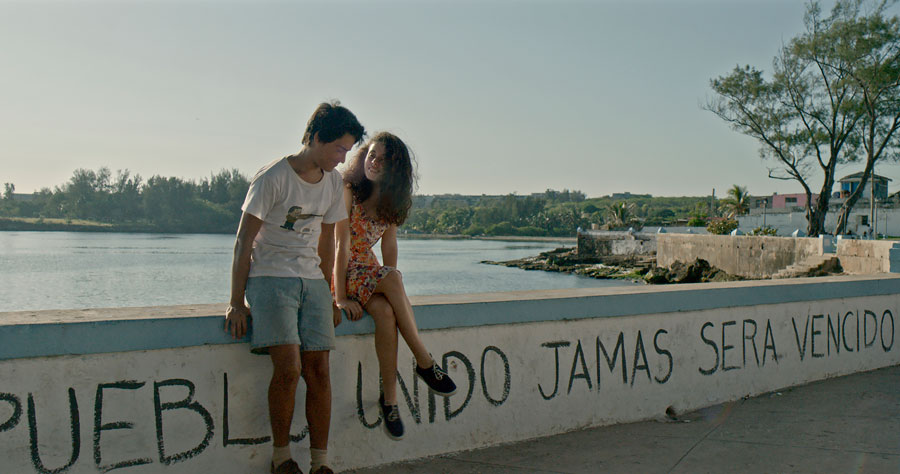
Agosto
Cuba, Costa Rica, Francia, 2019
Dirección: Armando Capó
Guion / Script: Abel Arcos, Armando Capó.
Producción / Production: Marcela Esquivel Jiménez.
Fotografía / Cinematography: Javier Labrador Delafeu.
Edición / Film editing: Juan Soto (E.C.C.A), Ariel Escalante.
Intérpretes / Cast: Damián González Guerrero, Alejandro Guerrero Machado, Glenda Delgado Domínguez, Luis Ernesto Bárcenas.
Duración: 85 minutos
Cuba, verano de 1994. En medio del Período Especial, una de las más grandes crisis en la historia del país, miles de balseros cubanos intentan llegar ilegalmente a Estados Unidos, sin estar seguros de si lograrán sobrevivir. Con el inicio de las vacaciones, Carlos se sumerge en un despreocupado agosto, deambulando con sus amigos y enamorándose por primera vez. Poco sabe sobre el futuro incierto del país, hasta que, uno por uno, sus vecinos y amigos se marchan en busca de una vida mejor, las amistades se rompen y las familias se separan. En este caluroso verano, el mundo de Carlos se pondrá patas arriba.
Casi diez años de trabajo invirtió el cubano Armando Capó en la filmación de Agosto , su primer largometraje. Tanto tiempo para cuidar y mimar hasta el último detalle, fue recompensado con el estreno de la película en el Festival de Toronto, la posterior selección en la competencia Nuevos Horizontes de San Sebastián, y la obtención del Coral a la mejor ópera prima en el Festival de La Habana. Con la crisis de los balseros como telón de fondo, lo que Capó plantea es un honesto coming of age enraizado en sus propios recuerdos: "Es una historia que yo había vivido. Esas vacaciones la playa se llenó de balseros, la gente construía balsas y todos convivíamos en aquel pueblo costero; sin que yo, a mi corta edad, me diera cuenta de lo que aquello significaba". Agosto emerge así como un melancólico canto de amor a Cuba y sus gentes.
Cuba, the summer of 1994. The Special Period, one of the biggest crises in the country's history, is in full swing and thousands of Cuban rafters try to make the illegal crossing to the United States, not knowing if they'll survive. At the start of the holidays, Carlos sets about to enjoy a carefree August, kicking around with his friends and falling in love for the first time. He knows very little about his country's uncertain future, until, one at a time, his neighbors and friends leave in search of a better life; friends drift apart and families separate. During this hot summer, Carlos's world will turn upside down.
Cuban Armando Capó invested almost ten years of work into filming Agosto , his first feature. So much time to tend every little detail was rewarded with a premiere at the Toronto Film Festival, being chosen for the New Horizons competition at San Sebastián, and receiving the Coral to best debut at the Havana Film Festival. With the rafter crisis as backdrop, Capó proposes an honest coming of age story deep-rooted in his own memories: "It's a story I'd experienced. During those holidays, the beach was full of rafters, people built rafts and we all lived in that coastal town, without me realizing—being so young—what that meant." Agosto thus emerges as a melancholic love letter to Cuba and its people.
Armando Capó
(Gibara, Cuba, 1979)
Estudió Dirección de Cine, TV y Radio en el Instituto Superior de Arte de La Habana (ISA) y Dirección de Documentales en la Escuela Internacional de Cine de San Antonio de los Baños. Es profesor de Cine Documental en el Instituto Superior de Arte. Dirigió, entre otros, los cortos La inercia, todos los pantógrafos van al cielo (2008), La marea (2009), Ausencia (2011) y La certeza (2012).
He studied Film, TV and Radio Directing at the Havana Higher Institute of Art (ISA) and Documentary Directing at the San Antonio de los Baños International Film School. He is a professor of Documentary Cinema at the Higher Institute of Art. He has directed the short films La inercia, todos los pantógrafos van al cielo (2008), La marea (2009), Ausencia (2011) and La certeza (2012), among others.




